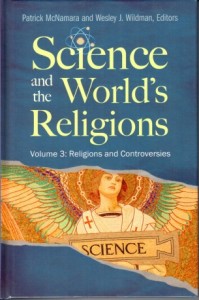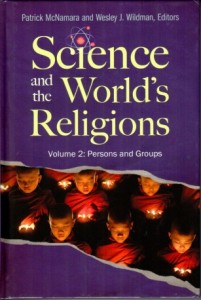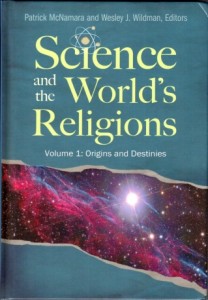

 Praeger has just released three volumes of new essays on Science and the World’s Religions. Each of these volumes has been in preparation for a couple of years and represents one aspect of the work of the Institute for the Biocultural Study of Religion. The volumes are edited by Patrick McNamara and Wesley J. Wildman, Founders of the Institute (find out more about the Institute here).
Praeger has just released three volumes of new essays on Science and the World’s Religions. Each of these volumes has been in preparation for a couple of years and represents one aspect of the work of the Institute for the Biocultural Study of Religion. The volumes are edited by Patrick McNamara and Wesley J. Wildman, Founders of the Institute (find out more about the Institute here).
Science and the World’s Religions consists of three volumes of new essays, written by experts recruited specifically for this project, and targeted for the generally educated reader. Each essay addresses a vital existential, moral, or metaphysical issue that many thoughtful people ponder—an issue on which satisfying progress requires integrating scientific and religious insights. Educated people in many parts of the contemporary world, whether religious or not, struggle to unite their spiritual instincts and their scientific knowledge. Most people do not have the time or the opportunity to decide how to weave all of these threads of knowledge and belief together into a tapestry that can help describe and guide their lives. These volumes are aimed directly at this audience. They can function as workbooks for such readers, full of ideas that need to be digested slowly.
The first volume focuses on Origins and Destinies. This theme encompasses issues ranging from the origins of religious beliefs and practices to the questions of meaning and purpose that most people ask about their own lives as well as about human history and the universe as a whole.
The theme of the second volume is Persons and Groups. This focuses on issues surrounding human nature, the ways religion is entangled in both the problems human beings face and the solutions they seek to construct, and the roles of religion in the human life cycle.
The third volume tackles Religions and Controversies. The educated lay reader is sharply aware of problematic issues at the junction of science and religion but struggles to find accessible presentations that both achieve intellectual depth and rise above mono-traditional parochialism. These issues arc from the compatibility of religion and evolution to interreligious competition, and from the standing of science and religion as forms of knowledge to questions about human responsibility in the face of racing technology.
Virtually every major area of scientific work is discussed at some point in these volumes. The essays also engage diverse religious perspectives, drawing from traditions such as Hinduism, Buddhism, Confucianism, Daoism, Judaism, Christianity, Islam, and indigenous religions. The organizing principle of each essay is not one science’s take on a religious question, or one religion’s take on a scientific question, both of which are valid but overused genres of science-religion writing. Rather, each essay is an integrative reflection on a vital existential and practical issue, drawing on multiple relevant sciences and engaging at least two religious traditions. Furthermore, many of the essayists in these volumes rose to the challenge we placed before them, namely, to deploy a bio-cultural theoretical approach to the subject matter—that is, an approach that unites biological perspectives (evolution, neurology, cognitive science, etc.) and cultural analysis (history, sociology, economics, etc.).
